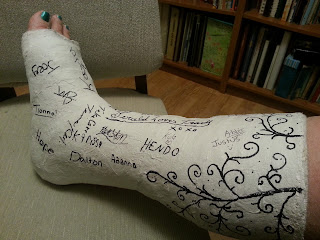Do you know the old adage, "If you scratch my back, I'll scratch yours"?
Book marketing is all about helping one another. Interesting that Jesus was all about that concept too. (John 15:12) If you've ever tried to create a "buzz" about your books, you will know that this is so true. You can't do it alone!
You will discover that the number one thing a new writer/author needs to do right away is connect with other writers and authors who share your common passion for the written word (and if you're a Christian author it's important to connect with other Christian writers who also share your passion for God.) There are numerous great groups to network with:
John 3:16 Marketing Network,
The Book Club Network,
Edgy Christian Fiction,
Crossreads and of course here in Canada
The Word Guild and
Inscribe! There are numerous groups and websites like Goodreads, Shelfari, Twitter and Pinterest as well as a host of other Christian Author Facebook groups and pages, where you can join and connect with other writers.
Anyone who is a Christ-follower knows that "community" is essential for encouragement and support. We share our joys and we share our burdens. We're a tight-knit family and it is so wonderful to know that we're not alone on this journey but we have each other to help along the way.
Unfortunately, I have also noticed that in every family (and in this case I'm going to talk exclusively to the writing community) there are those that seem to have no trouble
accepting help from others to promote and market their books, but are not as willing to reciprocate when asked. Some even get downright rude and offensive about it.
Here are my thoughts on the matter.
1. If you are a writer/author and you want others to blog, tweet or promote your books on Twitter (or anywhere else), you should be willing to do the same for someone else.
2. If you want lots of followers on Twitter,
follow lots of people on Twitter. My rule of thumb is I won't follow someone on Twitter even if they have 100,000,000 followers or more if they don't follow back. (Sorry @justinbieber) Sure there are those that are just spammy advertisers (be cautious about that), but if you want followers to "retweet" about your book promotion someday, it's not asking a lot to follow them back in return. Let me give a wonderful example here:
Tricia Goyer! Tricia, Christian author of 30 books, award winning writer and prominent speaker, has 55,500 + followers on Twitter. She follows well over 56,000 people back. She takes time to connect with her followers too; she thanks followers who follow her back and she actually reads the tweets people send to her! If you want a great example of a "tweeter" follow Tricia!
@triciagoyer
3. If you expect people to "like" your postings, pages etc. on Facebook, return the "likes" right back! Make an author's day and go on Amazon and see their book listing-"like" their book as well as their Amazon author page :)
4. If you expect people to read and review your books,
read and review their books. Take it one step further: if you want authors to buy and/or read your books...
BUY and/or read their books! I know it gets pricey to buy print books all the time but you could do a book exchange for instance, send a PDF of your manuscript to them and they do the same for you. I love doing author interviews on
Word Salt. Most of the authors I've interviewed on my blog have reciprocated and hosted me on their blogs. We've done book exchanges and/or we've purchased one another's books. You can come up with unique (and inexpensive) ways to help with their promotional marketing efforts and they'll be happy to return the favour.
5. Taking it yet another step further - when you do a review of a book, a little "honey" goes a long, long way. There's a right way and a wrong way to review a book. Honesty is one thing, cutting a manuscript to pieces with your critical review on Goodreads or Amazon will just break an author's spirit. (Proverbs 15:1 "A soft answer turns away wrath, but a harsh word stirs up anger.") Give an honest review but ensure that you have listed more positives than negatives if possible. If that's not possible, perhaps the best thing to do is this: "If you have nothing nice to say, say nothing at all."
6. Last thing..."Don't get too big for your britches!" So you've published a bunch of books (all best sellers)...wonderful! Just remember that you were a "newbie" once. You didn't have a clue what you were doing when you started out in the business and you made lots of mistakes before you published your first book (traditionally or otherwise). Take time to share your expertise, as well as your failures with new writers who need encouragement. I wouldn't have published a word without the mentoring of a couple of friends and authors,
Connie Cavanaugh and
Kathy Howard. Both of them, prominent speakers and writers in their own right, when I ask them to help promote my books (even though I know they are extremely busy ladies with book and speaking tours themselves) they do not hesitate to say, "Count me in!"
If you are an author and writer, determine to be the kind of friend you would want to have in this business. You'll be glad you did.
 Lynn Dove calls herself a Christ-follower, a wife, a mom, a grandmother, a
teacher and a writer (in that order). She is the author of award winning books:
The Wounded Trilogy. Her blog, Journey Thoughts won a Canadian Christian Writing Award -
2011. She has also had essays published in "Mother of Pearl: Luminous Lessons
and Iridescent Faith" and "Chicken Soup for the Soul - Parenthood" (March
2013). Readers may connect with Lynn on Facebook, Twitter and on her blog: Journey Thoughts
Lynn Dove calls herself a Christ-follower, a wife, a mom, a grandmother, a
teacher and a writer (in that order). She is the author of award winning books:
The Wounded Trilogy. Her blog, Journey Thoughts won a Canadian Christian Writing Award -
2011. She has also had essays published in "Mother of Pearl: Luminous Lessons
and Iridescent Faith" and "Chicken Soup for the Soul - Parenthood" (March
2013). Readers may connect with Lynn on Facebook, Twitter and on her blog: Journey Thoughts













